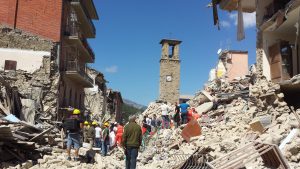Though it did succeed in bringing together the people of Italy and beyond, the recent earthquake in the Apennines was a tragic reminder of the country’s volatile geology, writes Tom Alberto Bull

The small towns dotted around the Apennine mountains, which spread for hundreds of kilometres down the spine of Italy, are some of the most peaceful you could come across. Many such places have been left untouched for centuries, unaffected by the changes of the times below the tranquil isolation of their high altitude location. Hidden away in the Gran Sasso and Monti della Laga National Park, Accumoli, for example, has its origins in the 12th century and is home to a small community of around 650 permanent residents.
On the 24th of August all of this was to change. Just after 3.30am, while almost all of the residents were sleeping, a 6.2-magnitude earthquake ripped through the area. The resulting damage was on a scale this area had never witnessed in its long history. As well as Accumoli, the worst affected towns were Pescara del Tronto, Arquata, and Amatrice – the largest of the four. The vast majority of these towns have been completely destroyed, leaving a pile of rubble where entire communities once stood.
In these tragic circumstances, the Italian community as a whole quickly grouped together to do all they could to help the victims. An instant rescue operation was launched with many volunteers working alongside professionals around the clock to search for survivors. In Pescara del Tronto a 10-year-old girl was pulled from the rubble 17 hours after the earthquake had struck. Despite their best efforts the extent of the damage made the operation extremely difficult with the death toll surpassing 250 people.
Thousands of Italians joined groups on social media to organise aid collection points around the country, including food, clothing and blankets to send to the areas affected. Others offered their spare rooms to people that had been left homeless, including some hotels. Italy’s national museums, meanwhile, embarked on a fund-raising campaign, donating their Sunday proceeds to relief and reconstruction efforts. These acts of kindness go some way in helping the victims get back on their feet while the government consider just how much of the area can be reconstructed.
In an effort to raise money for survivors, Italian food blogger Paolo Campana launched an appeal asking restaurants to put the dish pasta all’amatriciana on their menus as a tribute to those who died. Chefs around the world started to serve up the dish – which originated in Amatrice – with two euros from every plate sold donated to the Italian Red Cross. If you happen to see it on a menu near you in the coming months, give it a try!
Read this story in Italian
I piccoli paesi sparsi negli Appennini che si succedono per centinaia di chilometri lungo la dorsale italiana sono tra i più tranquilli che si possa immaginare. Molti di questi luoghi sono rimasti immutati per secoli, grazie al quieto isolamento dovuto alla collocazione geografica e all’altitudine, nascosti nel parco nazionale del Gran Sasso e dei Monti della Laga. Accumoli, ad esempio, ha le sue origini nel 12 secolo e ospita una piccola comunità di circa 650 residenti in pianta stabile.
Tutto ciò era destinato a cambiare radicalmente il 24 agosto. Poco dopo le 3.30 del mattino, quando la maggior parte dei residenti dormiva, un terremoto di 6,2 gradi di intensità ha devastato la zona. Il danno risultante era su una scala mai vista nella lunga storia di questa regione. Oltre ad Accumoli, i paesi più colpiti sono stati Pescara del Tronto, Arquata e Amatrice – il più grande dei quattro. La gran parte di questi paesi sono stati completamente distrutti, lasciando un cumulo di macerie là dove prima vivevano intere comunità.
In queste tragiche circostanze, la nazione italiana si è unita nel fare tutto ciò che poteva per aiutare le vittime. Una operazione di salvataggio è stata avviata immediatamente con tanti volontari che lavoravano a fianco dei professionisti 24 ore su 24 alla ricerca dei sopravvissuti. A Pescara del Tronto una bambina di 10 anni è stata estratta dalle macerie ben 17 ore dopo il sisma. Nonostante tutti gli sforzi l’estensione del danno ha reso l’operazione estremamente difficile e il bilancio dei morti ha superato le 250 persone.
Migliaia di italiani si sono organizzati sui social media per creare in tutto il paese punti di raccolta di cibo, vestiario e coperte da inviare alle zone colpite. Altri hanno offerto le loro stanze libere a coloro che sono rimasti senza tetto, compresi alcuni alberghi. I musei nazionali italiani, a loro volta, hanno iniziato una campagna di sottoscrizione, donando gli introiti domenicali per gli aiuti umanitari e la ricostruzione. Questi atti di generosità aiutano le vittime a rimettersi in piedi mentre il governo calcola quanta parte dell’area potrà essere ricostruita.
Nello sforzo di raccogliere fondi per i sopravvissuti, un food blogger italiano, Paolo Campana, ha lanciato un appello chiedendo ai ristoranti di includere nel menu la pasta all’amatriciana per rendere omaggio alle vittime. In varie parti del mondo diversi cuochi hanno iniziato a servire questo piatto – originario di Amatrice – donando due euro alla Croce Rossa Italiana per ogni ordinativo. Se vi capita di trovarlo nel menu di un ristorante vicino a casa vostra, vi suggeriamo di ordinarlo.
